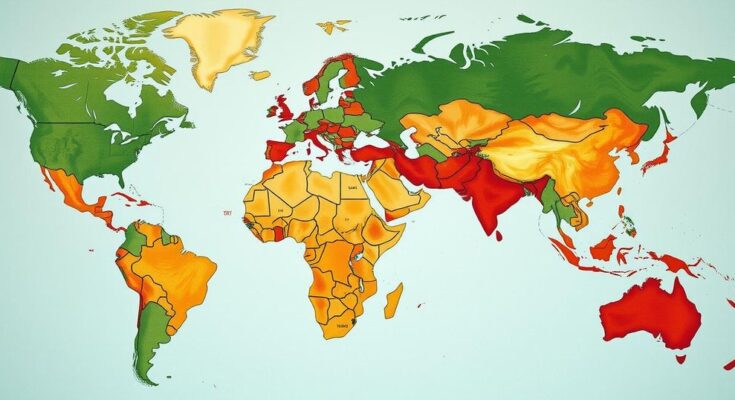A coalition of climate-vulnerable countries is urging for a reformation of the credit rating system to include climate resilience efforts. Current ratings primarily reflect economic risks posed by climate change, often overlooking proactive initiatives that limit investment access for nations like Cuba and the Maldives. Advocates aim to achieve a comprehensive evaluation that aligns with the $1.3 trillion climate finance goal by 2025, facilitating a more equitable financial landscape and fostering sustainable investments.
A coalition comprising nations highly susceptible to climate change is advocating for significant reforms in the credit rating system, emphasizing the necessity to incorporate climate resilience efforts. This issue was prominently discussed during a recent United Nations assembly held in New York. Current credit ratings, primarily issued by agencies such as Moody’s and S&P Global, often reflect economic threats stemming from climate change, neglecting the resilience measures undertaken by these vulnerable nations. This oversight is particularly detrimental for Small Island Developing States (SIDS), such as Cuba and the Maldives, which face considerable climate challenges and frequently receive sub-investment or ‘junk’ ratings. Such ratings severely restrict their capacity to attract vital investments.
Proponents of the reform are advocating for a more comprehensive credit evaluation process that would take into account both the risks posed by climate change and the proactive efforts undertaken to enhance resilience. This shift aims to facilitate the attainment of the ambitious goal of raising $1.3 trillion in climate finance, a target set for the finance summit scheduled to take place in Spain in 2025. Furthermore, the emergence of an African ratings agency may also lead to a more equitable assessment within the financial market.
The implications of these reforms extend to investment opportunities arising from climate challenges. The prevailing credit rating framework does not adequately recognize the advancements made by vulnerable nations in improving their climate resilience, resulting in lost investment opportunities in regions critically important for global sustainability. By reforming the credit rating approach, new avenues for investment could be opened, reinforcing the financial landscape in favor of sustainability efforts.
On a broader scale, integrating climate resilience into credit ratings questions established norms and advocates for a more equitable financial system. These recommended reforms hold significant economic and environmental repercussions, as they seek to empower developing nations, stimulate financial incentives that are aligned with sustainability goals, and contribute to the reshaping of international financial policies.
The current debate about credit rating reforms is rooted in the urgent need to address the disproportionate impact of climate change on vulnerable nations, particularly Small Island Developing States (SIDS). Credit ratings play a crucial role in determining a country’s ability to attract investment and manage debts. Traditional credit rating agencies have not adequately accounted for the efforts made by these vulnerable nations in enhancing their resilience against climate impacts. This has led to a continuous cycle of low ratings, limiting their financial opportunities and hindering their capacity to implement essential climate adaptation strategies. The recent discussions at the UN assembly signal a broader recognition of the need for change in credit evaluation methods to support sustainable development initiatives.
In summary, the coalition of climate-vulnerable nations is effectively advocating for a reformed credit rating system that incorporates climate resilience initiatives, addressing significant gaps in current rating practices. This evolution in credit evaluations has the potential to unlock investment opportunities, create a fairer financial landscape, and align global financial policies with sustainability goals. As discussions progress, the need for a more equitable assessment approach becomes increasingly clear, with the potential to foster significant economic and environmental benefits for vulnerable nations.
Original Source: finimize.com




